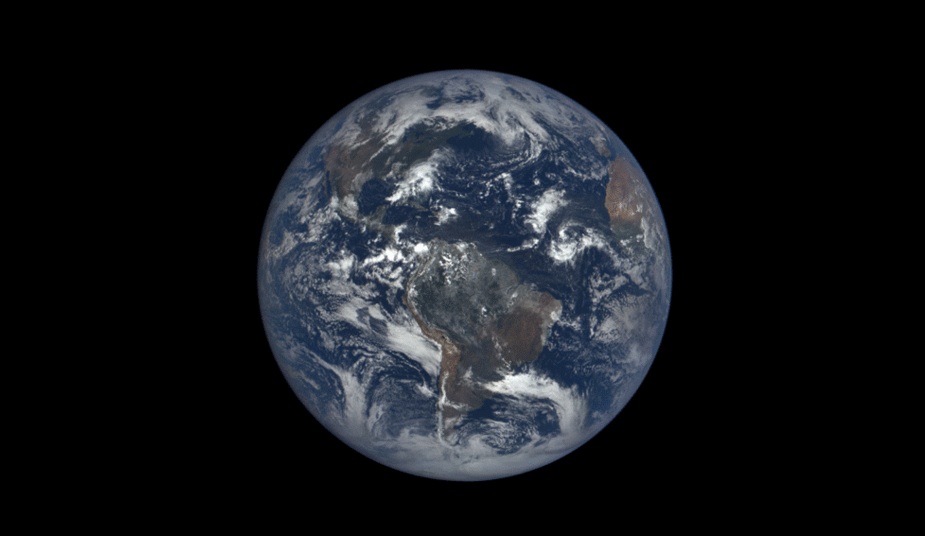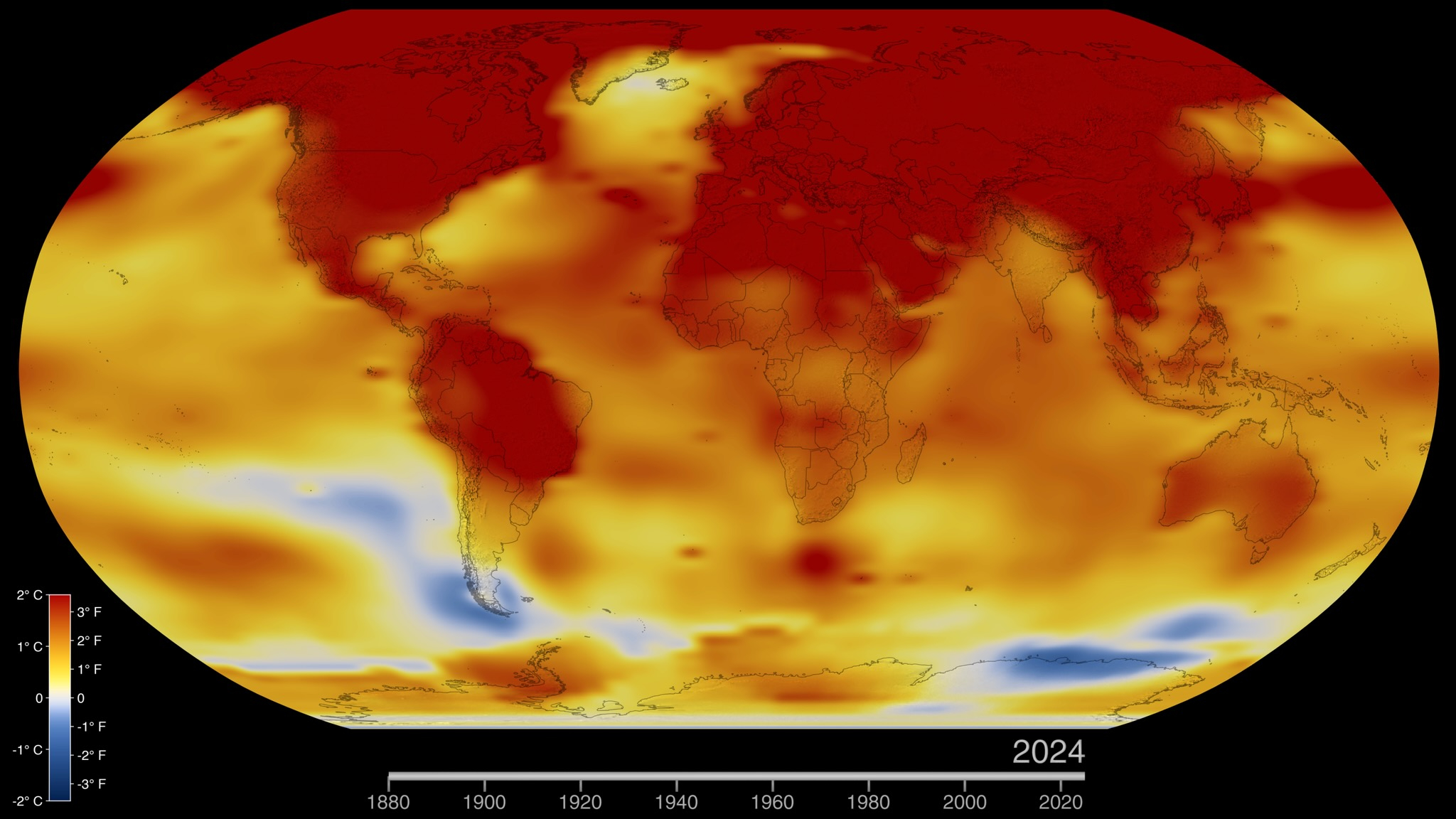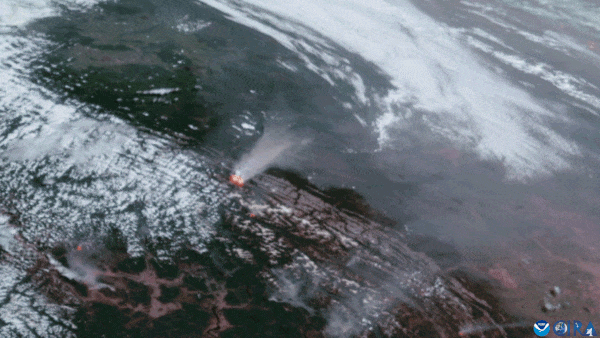Is Earth 'on the brink'? 2024 was likely our planet’s hottest year in 125,000 years
"Earth systems can recover if given the chance."

2024 may have been Earth's hottest year in at least 125,000 years, according to a grim climate report published Wednesday (Oct. 29) that describes our world as "on the brink" and warns its "vital signs are flashing red," with nearly two-thirds showing record highs.
Last year had already been declared the hottest on record (those records dating back to the late 1800s), following 2023 — which used to be considered the warmest year in human history. The year 2024 also capped a decade of record-breaking heat fueled by human-caused climate change, continuing a trend that began in 2015. Now, the new report, led by researchers at Oregon State University, suggests the year was also likely hotter than the peak of the last interglacial period, roughly 125,000 years ago, when natural shifts in Earth's orbit and tilt made the planet warmer and sea levels several meters higher. That result is based on previously published climate studies.
The study concludes that 22 of 34 measurable indicators of Earth's health, including greenhouse gas levels, ocean heat, sea ice and deforestation, have reached record extremes. The authors warn that these trends suggest humanity is in a "state of ecological overshoot," consuming the planet's resources faster than they can be replenished.
"The message is simple in that the climate crisis has entered an emergency phase and every tenth of a degree of avoided warming matters," William Ripple, a professor of ecology at Oregon State University who co-led the new report, told Space.com. "We need courage, cooperation and speed."
Published in the journal BioScience, the report shows that planet-warming gases such as carbon dioxide and methane reached record levels again in 2025, with carbon-dioxide concentrations at Hawaii's Mauna Loa Observatory surpassing 430 parts per million in May — a level likely unseen in millions of years.

According to the researchers, the ongoing warming stems from a combination of a few things.
For one, there are fewer sunlight-reflecting aerosols in the atmosphere, such as sulfates from industrial pollution, allowing heat to build up. These aerosols also influence how clouds form and reflect light; as temperatures rise, clouds are becoming thinner and less reflective, trapping more heat. Our planet is darkening too, as Earth's reflectivity, or albedo, is dropping to near-record lows due to melting ice and reduced snow cover that expose darker surfaces that absorb even more heat. Recent research has shown the Northern Hemisphere is darkening faster than the South, creating an imbalance that scientists say is rising faster than models predicted, and could intensify warming in the northern hemisphere and disrupt global weather patterns.
Breaking space news, the latest updates on rocket launches, skywatching events and more!
The effects of these trends are visible across the planet, including in all-time high ocean heat, which fueled the largest coral-bleaching event ever recorded, according to the National Oceanic and Atmospheric Administration. Greenland and Antarctic ice masses are now at record lows, with loss rates quadrupling since the 1990s — evidence, the report notes, that both regions may have already crossed critical tipping points that could lock in several meters of future sea-level rise.
Forests, too, are under stress. Studying satellite data, Ripple's team found that global tree-cover loss reached 29.6 million hectares in 2024, the second-highest total on record and nearly 5% higher than what was seen in 2023. Fire-related losses surged 370% over the course of 2023, fueled by hotter, drier conditions driven by human-induced climate change and El Niño, the researchers found.
These trends illustrate that nature's built-in safety nets against climate change, such as forests, soils and other ecosystems that capture and store carbon, regulate nutrients, and buffer against environmental extremes are "starting to falter," Ripple said.
By August 2025, the European Union had endured its most extensive wildfire season on record — the fires burned more than 1 million hectares — and Canada faced its second-largest fire season. As fires burn, they release massive amounts of carbon into the atmosphere, heating the planet and increasing the risk of even more fires — a dangerous, self-reinforcing cycle of warming, the study warns.

"It's difficult to pinpoint thresholds where climate tipping points are crossed and changes may become irreversible," Ripple said, "but it's increasingly clear that even current levels of warming could destabilize the Earth system."
Brazil's Amazon — which holds about 60% of the world's largest tropical forest — is one of the few bright spots in the report. Deforestation there fell by about 30% in 2024, reaching its lowest level in nine years, thanks to "strengthened environmental enforcement under President Luiz Inácio Lula da Silva's administration, which has prioritized conservation efforts," , the authors note.
The team's findings align with another major climate assessment released earlier this month. That report, authored by 160 scientists from 87 institutions in 23 countries, warns that warm-water coral reefs that support nearly a billion people and a quarter of all marine life are crossing their tipping point, as evidenced by mass die-offs already under way. The report also flags looming tipping points for the Amazon rainforest, polar ice sheets, and key ocean currents that help regulate Earth's climate.
"The findings of this report are incredibly alarming," Mike Barrett, a chief scientific advisor at the World Wildlife Fund in the U.K. who co-authored the report, said in a statement. "That warm-water coral reefs are passing their thermal tipping point is a tragedy for nature and the people that rely on them for food and income."
The twin reports arrive just weeks before the United Nations climate summit in Brazil, where scientists hope their findings will push world leaders to take stronger action against these cascading threats.
"As we head into the COP30 climate negotiations it's vital that all parties grasp the gravity of the situation and the extent of what we all stand to lose if the climate and nature crises are not addressed," Barrett said in the statement. "The solutions are within our reach — countries must show the political bravery and leadership to work together and achieve them."
Both reports stress that solutions exist, and there is still time to act. Rapidly scaling renewable energy, especially solar and wind, "is likely the single most powerful lever," Ripple said.
When asked what gives him hope that humanity can still avoid the worst outcomes described in the report, "hope comes from nature's resilience and human ingenuity," he said. "Earth systems can recover if given the chance."

Sharmila Kuthunur is an independent space journalist based in Bengaluru, India. Her work has also appeared in Scientific American, Science, Astronomy and Live Science, among other publications. She holds a master's degree in journalism from Northeastern University in Boston.
You must confirm your public display name before commenting
Please logout and then login again, you will then be prompted to enter your display name.
